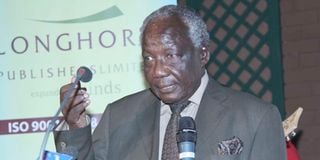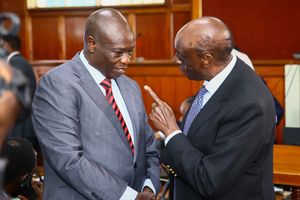Recalling my last interview with veteran journalist Philip Ochieng

Philip Ochieng during the launch of his biography written by Liz Gitonga-Wanjohi at The Stanley on August 21, 2015.
One cold morning in July, 2013, my colleague, Mayaka Gekara, and I left our Nation Centre offices and headed southwestwards to Rongai on the outskirts of Nairobi.
We had recently started a joint column, a fairly irreverent literary-cum political interview in which we asked key figures searching questions and ran them verbatim every Saturday.
On this morning we were excited that Philip Ochieng, the enigmatic, strongheaded colossus of Kenya’s journalism, had agreed to our request for a duel.
We were not part of a generation that worked with Ochieng in the newsroom, the more reason our intellectual curiosity was stirred. We called our column ‘Conversations with Book Lovers’ and if there was ever the greatest bibliophile in Kenya, that must be Ochieng.
We wanted to know: What made the author of the famed I Accuse the Press, who had himself been criticised for deploying his considerable intellectual weight to prop up the repressive Kanu regime tick? How was it that a gifted student on a scholarship to the US in the heady days ahead of independence came back without a degree?
We would also pose a few other questions around his legendary reading habit, his highbrow writing, his famed arrogance, his political views and, generally, his philosophy on money, drink, women, anything.
We picked him up outside his home off Magadi Road and for the next two hours – in the car, at a café and in the car again – wrestled the surprisingly soft-spoken, even shy, interlocutor whose stutter was a far cry from the eloquent force of his writings.
Kanu briefs
The interview started alright, before hitting a crescendo around the questions of his reading, his exploits in the US where he and friends ‘painted Chicago red’ with beer, before taking a dip at the end when we asked him about the infamous Kanu briefs.
He shouted his answer at us from a distance after he unhappily alighted from our car at the forested Catholic University of Eastern Africa area.
“I don’t know why you have not accepted when I tell you that I didn’t write those things,” he said, exasperatedly, of the character-assassinating articles aimed at government critics – explaining that he had been sacked from Kenya Times in 1991 “perhaps to pave way for the writing of those briefs in the election year of 1992.”
He, however, admitted that he said many things that were not well-received by the Kenyan 'left’.
“I said many things in those years which were not popular, like telling off then American ambassador Smith Hempstone for interfering with our politics and talking at our politicians as if they were children. But the same politicians who pilloried me then celebrated me for telling Edward Clay the same thing. My values have not changed. Things change. Maybe I was ahead of my time,” he said.
Ochieng had joined Kenya Times in 1988 from the Daily Nation, where he had been managing editor. He had also worked at The Daily News of Tanzania during the editorship of Benjamin Mkapa, the future president, and the Sunday Times Uganda, during the Entebbe raid, as well as a few other publications intermittently, here and there.
We asked him why he should not share blame for what he called intellectual poverty in the newsroom seeing as he had been at the centre of it for more than four decades.
“I made my contribution. I remember suggesting to one of the editors at the Sunday Nation that the weekly should not compete with the Daily Nation for ordinary news. We wanted to make Sunday Nation what a weekend newspaper should be: a weekend digest. We wanted many pages devoted to long, thoughtfully written stories on science, technology, religion and so on,” he argued.
He traced his reading to long after Alliance. “My line was supposed to be literature, but I have educated myself in chemistry, physics and French. Math has been probably my greatest challenge.”
He used the word ‘supposed’ informedly because he didn’t graduate from Roosevelt University in Chicago, having allowed his spirit to wander into other disciplines and extra-curricular affairs, including a second marriage.
Ochieng’s intellectual contribution was as diverse as it was controversial. He informed us that he was working on five books whose fate now remains unclear. One was on Histories and the Controversies of the Media in Kenya which he said was on its way to the publisher.
Intellectual problem
“The other is How Europe Destroyed the Human Essence of Our Species. (Yet) another is History of Religion, where I am showing that Christology (the notion that God sent a messenger [his son] to save mankind) was invented in Africa. There is an intellectual problem. The whole notion of a son implies sex. Can a male God have a son? If it were so, then Christology has been quiet about his female partner,” he reckoned.
Ochieng is credited for bringing to light the famous poem Song of Lawino, which he published in the econo-political East Africa Journal to which he lent a literary bent.
“We published p’Bitek’s Song of Lawino when it had been rejected by all houses. The publishing house that later produced it apologised for not appreciating the importance of oral tradition,” he offered.
But Ochieng also sought to disabuse admirers of their exaggerated claims that he read several books at a time, explaining that he only read one at a time because he read to share in a digested form, an enterprise which took time and energy.
Still, we asked him to estimate the amount of money he had used in buying books, which he was known to own by the truckload.
“I have invested a lot in books. Indeed, it is the cause of my poverty. I may not put a figure to it, but I spend a third of my monthly earnings on buying books.”
So, with all this reading why did he come back from the US empty handed despite having been a beneficiary of the Mboya/Kennedy airlift of 1959? What went wrong?
“I did not complete my degree in Literature because I married at a dangerous time — only two years after I had landed in Chicago. The result of that union is a daughter who discovered me two years ago.”
Predicament
He refused to blame his predicament on drink, to which he was considerably devoted. “Yes, we drank lots of beer. I had not graduated into whiskey those days, but drinking was not the cause of my situation. It is the marriage thing.”
He said his reportage, jointly with Brian Tetley, of the murder of Tom Mboya, considered a masterpiece, was written under the influence of alcohol, but insisted it is his colleague who took the gold standard as he was “never known to write a sentence without knocking down a few bottles.”
Commenting on some of the major political figures, he described the nationalist Mboya as a town sophisticate, a dancer, a boxer, a footballer and a woman killer, saying he loved women like “sukari nguru”.
He described Raila Odinga as a tragic hero with a tragic flaw, saying the politician’s Achilles’ heel was his inadvisability. “This he probably inherited from his father Jaramogi, who could say unsayable things. How can he allow ragamuffins to do things in his name? He is the leader. He must teach them or cane them. How can you be courting the Kikuyu, for instance, then allow ragamuffins to disrupt their businesses?
He remained unrepentant about his ‘difficult’ writing, saying it was not his job to come down to a reader’s level even as he insisted that he did not have the “intellectual arrogance of, say, Miguna Miguna.”
Yet we pressed on: For decades he had assigned himself a higher pedestal from which he moralised and talked at society. From which Mount Ararat, we asked, borrowing from his own favourite metaphor, did he draw his moral authority?
“I don’t know that I have any Ararat. I just think that something is wrong or right, and I write about it for social consciousness. I don’t say I am Shakespeare’s be-all and end-all,” he said.
I would talk to Ochieng again in 2016 when his American daughter came to Kenya. He said the daughter would “find us as we are.” Juliette Akinyi’s visit brought to life the truth in her father’s famous self-description as an “entrepreneurial idiot,” who did not make a fortune from his decades in journalism, most of them at the helm.
Just to be sure, Akinyi appealed for donations to help make her trip successful. “While the trip and the lodging are already paid for by my generous friend, I will have to pay for my meals,” she wrote in a post titled ‘Why I am ‘begging’ for my Kenyan trip’.
Even after her brother assured her of transport from Nairobi to their ancestral village, she did not want to leave that to chance, “especially since their mother – my father’s present wife – is very ill and they have many medical bills to pay.” Ochieng’s wife, Jennifer Dawa, would die later that year.
When Akinyi first made contact with her father in 1997, Ochieng was elated, telling his biographer Liz Gitonga-Wanjohi that his daughter “did a good thing to look for him even though he had abandoned her.
“I am also happy with her because she keeps my name. American women, when they remarry, force their children to take on their next husband’s name,” Ms Gitonga-Wanjohi writes in The 5th Columnist: A legendary Journalist, published in 2015.
Ochieng wrote his last column ‘Mark My Word’ up to nearly the end of his life and left an indelible mark in his books – most notably I Accuse the Press and The Kenyatta Succession – which he co-authored with Joseph Karimi – and in the hordes of journalists he mentored – or just inspired.
If journalism is the less sublime sister of literature, Philip Ochieng of Manyatta, Awendo, who rose to become one of the most influential public intellectuals of his time, was the high priest who tried to narrow this gap.
Julius Sigei, a former ‘Nation’ editor, works with the Media Council of Kenya. Email [email protected]





